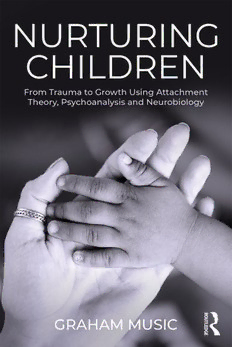Table Of Content‘Dr Music is certainly one of the best and probably the most deep thinking child
psychotherapistsintheworld.Thisbeautifulbookdistillsdecadesofneuro-clinicalthinking,
interpreting children’s and young people’s experience and behavior in terms of the most
applicable and scientifically credible models of mind. For those who wish to understand
clinicalphenomena and throughthisimprove their clinical work, thisbookisa must. For
those who want to marvel and learn from the writing of a master clinician, this book is
amongstthebestyouarelikelytoencounter.Andforthefewwhowanttodoboth…thisis
anincredibleopportunity.Icouldnotrecommendabookmorestrongly.’
–ProfessorPeterFonagyOBE,HeadoftheDivisionofPsychologyand
LanguageSciencesatUCL;ChiefExecutiveoftheAnnaFreud
NationalCentreforChildrenandFamilies,London,UK
‘Ofalllifeformsonthisplanethumaninfantsarebyfarthemostdependentontheloveand
caretheyreceivefromtheirparents.Theneedforcaringcanextendwellintotheadolescent
yearsandbeyond.Notonlydoparentsprotectthembuttheyshapethematurationoftheir
braindevelopment,therobustnessoftheirimmunesystemandeventheexpressionoftheir
genes. As an international, leading exponent of attachment theory and its applications in
child psychotherapy there could be no better guide than Dr Music to reveal the role of
attachmentasbothasourceoftraumaanditsrecovery.Bringingthereadermanyyearsof
therapeuticinsightandexperience,withaclarityofexpositionoffascinatingandimportant
case studies, this is a wonderful addition to the literature. All therapists and other profes-
sionalsworkingwithchildrenwouldbenefitenormouslyfromthisbook.’
–ProfessorPaulGilbertOBE,authorofTheCompassionate
MindandLivinglikeCrazy
‘Graham Music has done it again. This is a much-needed book and the clinical work is
profoundlymoving. Music isable to blendhisowndeeply feltempathic capacities with
a comprehensive grasp of the latest developmental and neuroscientific research in a
highlyreadableform.Heisarealthinkerandallofusinthefieldofchildmentalhealth,
and for that matter, learning disability, will be extremely grateful for it. He really gets,
anduses,allthe newworkonthebody,too.’
–AnneAlvarez,consultant,childandadolescentpsychotherapist,
TavistockClinic;authorofLiveCompanyandTheThinking Heart
‘Ifyouarelookingforabookthattellsyouwhatattachment-based,neuroscience-informed
psychotherapy looks like in practice, look no further. Graham Music’s wonderful book
conveys the process brilliantly. It demonstrates how an attuned and compassionate
relationshipisthekeytopsychologicalgrowth,aprocessthatmightsoundeasyyetisin
practiceademandingartthatdrawsonallthepsychotherapist’sresourcestorespondatthe
right level, at the right moment. He is particularly good on the psychotherapist’s own
struggles to extend compassion to himself and to stay “alive and present” in difficult
therapeuticrelationships.’
–SueGerhardt,psychotherapist;co-founderofthe
OxfordParentInfantProject;andauthorofthe
bestsellingbookWhyLoveMatters
‘Graham Music takes us on a journey with him in his new book, Nuturing Children:
From Trauma to Growth Using Attachment Theory, Psychoanalysis and Neurobiology.
From his psychoanalytic “bedrock” Graham grows flowers, many of which include his
reflectionsonthethoughtsoftherapeuticmentorsandtheoristsaswellasontherapeutic
implicationsfromfindingsofattachmentandneurobiologyresearch.Yetthemostvibrant
flowers involve the moments that he spends coming to know the minds and hearts of
youngpeopleanddiscoveringthepathswiththemthatwillleadfromtraumatohope.In
thisworkGrahaminvitesusintohistherapeuticspacetobepresentwithhim–withboth
hismind andheart– asheispresentwiththesehurtandcourageousyoungpeople.
ToreadthisworkistoenterintoaconversationwithGraham,towonderwithhimabout
the meanings of what Molly, Michael, Samantha and the others are doing so to better
understand their unique experiences and find the one-of-a-kind therapeutic intervention
that will do them the most good. We share with Graham his wobbles and confusion,
recoveries and unfoldings, as he finds a way of relating with each child that may well
createsafety,healing,andintegration.Theseconversations,readilyavailabletousaswe
read,willbringGrahamwithusintoourtherapeuticspaceandenrichourworkwiththe
mindsandheartsofthechildrenwearecomingtoknowandcareabout,regardlessofthe
natureofthebedrockuponwhichwestand.’
–DanielA.Hughes, PhD,isaclinical psychologistwhospecializes in child
abuseandneglect,attachment,fostercare,andadoption.He isa prolific author
and activelytrains othertherapistsinthemodeloftreatmentknownasDyadic
DevelopmentalPsychotherapy,bothwithintheUnitedStatesandinothercountries
Nurturing Children
Nurturing Children describes children’s lives transformed through
therapy.
Drawing on decades of experience, internationally respected clinician
andtrainer GrahamMusictackles majorissues affecting troubled children,
including trauma, neglect, depression and violence. Using psychoanalysis
alongside modern developmental thinking from neurobiology, attachment
and trauma theory and mindfulness, Music creates his own distinctive
blend of approaches to help even the most traumatised of children.
A mix of personal accounts and therapeutic riches, Nurturing Children
will appeal to anyone helping children, young people and families to
lead fuller lives.
Graham Music is a consultant child and adolescent psychotherapist
at the Tavistock and Portman Clinics in London, UK, and an adult
psychotherapist in private practice who teaches, supervises and lectures
internationally.
This page intentionally left blank
Nurturing Children
From Trauma to Growth Using
Attachment Theory, Psychoanalysis
and Neurobiology
Graham Music
First published 2019
by Routledge
2Park Square, Milton Park, Abingdon, Oxon OX14 4RN
and by Routledge
52 Vanderbilt Avenue, New York, NY 10017
RoutledgeisanimprintoftheTaylor&FrancisGroup,aninformabusiness
©2019GrahamMusic
TherightofGrahamMusictobeidentifiedasauthorofthiswork
hasbeen asserted by him in accordancewith sections 77 and 78
of the Copyright, Designsand PatentsAct 1988.
All rightsreserved. No part of thisbookmay be reprinted or
reproduced or utilised inany form orbyany electronic,
mechanical, or other means, now known orhereafter invented,
including photocopying and recording, or in anyinformation
storage or retrieval system, without permission in writing from
thepublishers.
Trademark notice: Product orcorporate namesmay be
trademarksor registered trademarks, and are used only for
identification and explanationwithout intent to infringe.
British Library Cataloguing-in-Publication Data
A catalogue record for thisbookis available from the British
Library
Library of Congress Cataloging-in-Publication Data
Names: Music, Graham, 1957- author.
Title: Nurturing children: from trauma to growth using
attachment theory, psychoanalysis and neurobiology/
Graham Music.
Description: Abingdon, Oxon ;New York,
NY : Routledge, 2019.
Identifiers:LCCN2018039399(print)|LCCN2018050323(ebook)|
ISBN9780429437540(MastereBook)|ISBN9780429794360(Adobe
Reader)|ISBN9780429794353(ePub)|ISBN9780429794346
(Mobipocket)|ISBN9781138346055|ISBN9781138346055q(hardback)|
ISBN9781138346062(pbk.)|ISBN9780429437540(ebook)
Subjects:LCSH:Childpsychotherapy.|Adolescentpsychotherapy.
Classification:LCCRJ504(ebook)|LCCRJ504.M882019(print)|DDC
618.92/8914–dc23
LCrecordavailableathttps://lccn.loc.gov/2018039399
ISBN: 978-1-138-34605-5(hbk)
ISBN: 978-1-138-34606-2(pbk)
ISBN: 978-0-429-43754-0(ebk)
Typeset in Times New Roman
by Swales & Willis Ltd
This book is dedicated to my therapists, Roger, Mike, Celia
and Nathan, for facilitating my own journey from trauma
and anxiety into more well-being and a Good Life.
This page intentionally left blank
Contents
Acknowledgements xi
1 Introduction 1
2 Onefootintheditch 15
3 Resilience,mismatchesandrepair 27
4 Attachmentandjumpyuntrustingkids 39
5 Stuart:growingan‘innerexecutive’andamindtothink
thoughts 55
6 Lefthemispheresrule,feelingsavoided:JennyandEdward 71
7 Neglectedchildren:whyitiseasyyetdangeroustoneglect
neglect 87
8 Bringingupthebodies:bodyawarenessandeasefulselves 103
9 Traumaandtreadingcarefully 117
10 Angelsanddevils:sadismandviolenceinchildren 133
11 Altruismandcompassion:howtheycanbeturnedonandoff 145
12 Addiction,techandtheweb:newdangershijackingold
systems 157

